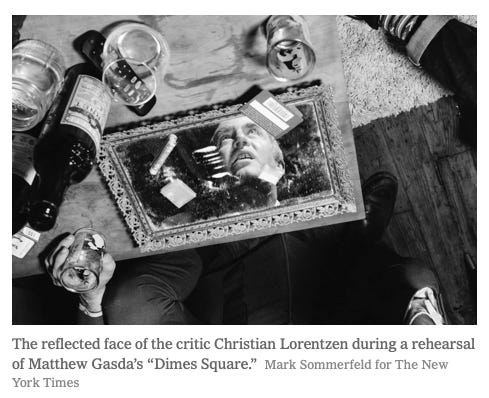Housekeeping: Idiots, Continue is a newsletter that provides commentary on the media and literary scenes of NYC. It is written by me, Becca, but I may have some guest writers in the future if things go well. It is free, but I really appreciate it when people sign up for a paid subscription because I am a precarious gig worker with high rent and looming credit card debt. No pressure, but if you have money to spare and like my writing, I would be eternally grateful.
I pledge to never flood my subscribers with too many emails. Most media, literary, and online drama is too stupid to comment on – I am very selective about my topics.
Like many of you, when I heard about the play Dimes Square a few months ago, my first thought was: What? Not a negative what, not a positive what, just an entirely neutral: What? As a writer, media-adjacent person, New Yorker, and lifelong learner, I naturally decided to investigate.
Matthew Gasda, the playwright and director, has a history of plays that intersect with life. He staged a pandemic play during the pandemic; his plays are usually performed in Brooklyn apartments and acted in by Brooklynites. It’s the kind of self-referential work that some (me) find amusing, and others (non-New Yorkers, non-writer nerds, etc) find grating.
The play is, of course, based on the ‘scene’ that revolves around a small area of Manhattan nicknamed ‘Dimes Square .’ The IRL players are a mix of young-ish artists, writers, skaters, layabouts, etc. The play players are the same. One bar that they frequent is called Clandestino. I have been there, twice, although to my knowledge I have never been there at the same time as the people the play depicts. Or maybe I have been! You never know. That’s what happens when you live in New York. You’re always 1 degree of separation away from whatever is hip podcast-play-indie newspaper-leftist magazine-art show-hot scene du jour.
But how did Dimes Square go from a fledgling in-joke of a scene to being written up in the New York Times? Well, there’s no way to know for sure. Who’s to say how a piece of art takes flight? Which pieces stick around and become popular and successful and which fade into obscurity? The truth is, there’s no magic metric — of course, an artist always hopes for the best, and there are certain actions you can take to position yourself well, but ultimately, it comes down to that je ne sais quoi.
Eventually, I was able to get in touch with Mr. Gasda and ask him a few questions. Our correspondence follows, lightly edited and condensed for clarity.
BS: Tell me about your background in theater.
MG: I moved to New York eleven years ago idealistically and ostensibly to be a writer. I was writing poetry and fiction (I still do); I was interested in film--anything but theater, really. But I loved Shakespeare, Ibsen, Chekhov, and Beckett--they were a part of the rotation of idols and as someone who was doing the kind of programmatic like 'these are things writers do' thing, I decided to write a play and enjoyed it. I actually just gave my first play to a director I walked up to after a show and the next day he called me, saying he wanted to direct it. We did a little workshop production and I got really hooked on the process. I kept writing, and I eventually started to try directing my own stuff. I enjoyed that too. Putting on plays became a way of life for me. For the past five or six years, writing, rehearsing, and producing has been how I prefer to spend my time, frankly. You make great friends, you can explore ideas and emotions that might otherwise get stuck in the subconscious, and it's challenging; getting a play to work is problem-solving; it's a puzzle.
BS: What inspired you about the “Dimes Square” scene?
MG: Dating, drinking, scene rivalries in no particular order.
BS: Relatable. How did you go from the idea for the play to the production?
MG: I wrote a draft very quickly in August/September, and we started table reads in late September. We must have met every week for about 12 weeks as a group, and I would rewrite in between readings. I worked with a dramaturg, Danielle Carr, and everyone in the cast provided input. The actors really show you what's working and what's not. Our cast is very literate--some people are 'real' writers--and the room was very high IQ and EQ. Some of the best ideas I pulled right from our group discussions. I felt like as a playwright, in this case, I was more of an aggregator and an editor--pulling insights into the scene into a single, coherent framework.
BS: How did you decide on the price point of the play – $50** per ticket?
MG: We're a self-supporting, self-producing co-operative team, so it's really the cost of everyone's labor--and not even that. For a 2+ hour show featuring 11 actors and crew, it's the only thing approaching a fair price. I understand it's pricey for an underground show, but it's like going to a little family-style restaurant--everyone's worked really hard to create an experience, and the price reflects the care that's gone into making the show.
BS: How has the experience of directing Dimes Square been for you?
MG: The experience is both exciting and stressful. The cast usually goes to a bar til 3/4 am after our Monday rehearsals; we all talk a lot, and everyone's grown close. There's also been a lot of buzz and support -- which is gratifying. On the other hand, producing a play is fucking stressful. Anything and everything that can go wrong usually does at some point. There's no safety net for contingencies--we can't afford a full repertoire of understudies (we have one for one role currently) and with loft spaces like we're using, there are things that can go wrong. The spaces aren't soundproof; shit happens in old buildings (electric, pipes), etc -- and neighbors can complain. So I worry a lot about a lot of worst-case scenarios!
BS: Is the location, Ty’s Loft*, a performance space, or is it a guy named Ty’s loft?
MG: Sort of both. Ty and his two roommates offered me space to do shows last summer, and since then, Ty's Loft has become an official unofficial venue.
*In the time since this conversation, the Dimes Square play has also been staged in other locations due to its popularity.
**Since the time of this conversation, ticket prices for the newer locations have risen to $65.
I was also able to speak with the play’s star, Christian Lorentzen, on the phone. Unfortunately, I forgot to record the conversation we had on the phone and it was right before I had a business call so my brain is wiped of exact quotes. He did confirm that the character he plays was loosely based on real him, or someone like him.
Christian also said that he was happy to have the opportunity to act in a play — as a professional literary critic, he was interested in taking part in another type of art, out of his usual wheelhouse. He confirmed that he and the other actors are being paid for their participation in the play. I did not speak to any other members of the cast, though I was informed by a source that one of them recently bought an apartment.
The play has lovers, and it has haters. This is to be expected from a hip play about hip people. The people who ‘get it’ love it, and the people who don’t hate it. It’s a tale as old as time or at least a tale as old as the internet. A piece of art getting ‘buzz’ inherently makes some people suspicious. And people love to be suspicious of inside baseball.
As I’ve written in this newsletter before, writing is, in many ways, a cottage industry. Inside baseball in a cottage industry sounds insufferable to some, but I, for one, think it’s hilarious. When reading the recent press of the play, I laughed the ol’ knowing laugh more than once: Gasda is producing another play and two of the stars were chatting about The Fuccboi on the street. One of those stars is actress / podcaster / shit-stirrer Dasha Nekrasova. A few years ago, Dasha’s name was known only to listeners of her edgelord podcast Red Scare and to a certain subset of New Yorkers. Now, she’s Kendall Roy’s assistant on Succession. That’s how it goes in the inside baseball cottage industry. I’m not knocking it — I pray every day that the same will happen to me, and one day my years of idiocy in the big city will pay off with some of the magic that only New York can deliver.
As I went through the process of learning about the Dimes Square play and speaking to some people involved, I realized that the reason I was so fascinated by the whole situation was one central question: Where does the bit end and reality begin?
The Eventbrite page for the show reads: “We are living through the dumbest time in human history.” It’s an oft-quoted internet phrase, but its intention in the literature is clear: the players are in on the joke. So, I repeat, where does the bit end and reality begin?
No one knows. It’s impossible to say. The play is described as a satire, of course, which adds credence to the idea that it is ‘a bit,’ but you know … what does that really mean? Did I decide to write about the play as a bit? Is not everything a bit? Commit to the bit. Live and die for the bit.
If you’re wondering what I thought of the play, well, unfortunately, I can’t tell you, because I haven’t seen it. Why, you ask? Well, it cost $50 and I have like, ⅓ of a job. No one offered me a comp ticket despite my clear intention to write about the play for this newsletter.** What a shame! I’m sure I would have enjoyed it. But alas …
**CORRECTION** Post-post, I was offered a comp ticket to a showing of Dimes Square on Saturday, 4/2. Unfortunately, I am currently on house arrest with my dog, because she was Bad while I was out of town recently and the landlord and I are in a Fight until I figure out how to get her to not bark maniacally while I am gone. I am sorry that this prevented me from seeing Dimes Square this weekend, but luckily, I am in the process of securing anti-anxiety medication for her, so *hopefully* the situation will be resolved soon and I will be out of dog-house-arrest.








The way I so eagerly read this with utmost curiosity, understand a different 4% than last time, second guess myself and wipe my memory of it makes for an infinite loop of entertainment. Is that the bit? The point? The point of the bit? The bit of the point? Thanks.